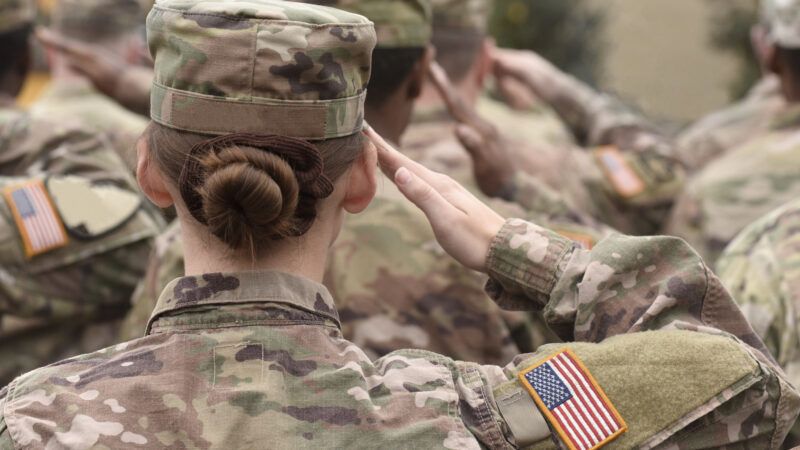House Passes Bill To Automatically Register Young Men for the Draft
The Selective Service should be abolished, not made more efficient and equitable.

The House passed a large defense bill Friday evening that included a provision that would automatically enroll young men between the ages of 18 and 26* for the Selective Service.
The House's version of the National Defense Authorization Act (NDAA), which would authorize $895 billion in military spending, passed by a vote of 217–199. It's unlikely to be picked up by the Democrat-controlled Senate because of numerous amendments regarding abortion, diversity efforts, and transgender medical treatments. The Selective Service provision, though, is part of an enduring bipartisan effort to keep the framework for military conscription in place, even though the draft ended in 1975.
Automatic registration would replace the coming-of-age tradition that all 18-year-old male U.S. citizens experience when they get a card in the mail from Uncle Sam informing them that they're required under threat of criminal penalties to register for the Selective Service.
Supporters of the legislation framed it as a more efficient and cost-effective method.
"By using available federal databases, the [Selective Service] agency will be able to register all of the individuals required and thus help ensure that any future military draft is fair and equitable," Rep. Chrissy Houlahan (D–Pa.) said on the House floor. "This will also allow us to rededicate resources—basically that means money—towards reading readiness and towards mobilization…rather than towards education and advertising campaigns driven to register people."
The other, unspoken effect would be removing young men's choice to engage in civil disobedience.
The draft is a hobby horse for Houlahan, an Air Force veteran. She also spearheaded a House bill in 2021 to require women to register with the Selective Service, effectively doubling the draft pool.
As Reason's Matt Welch wrote in 2021, the Selective Service is not a proud part of America's civic fabric but an on-again-off-again tool of the Pentagon:
The Selective Service System was first founded in 1917 to feed bodies into America's World War I efforts. It was disbanded in 1920, fired back up in 1940, re-formatted in 1948, and then terminated in 1975 as part of Washington's decisive shift to an all-volunteer military. Then a panicky President Jimmy Carter in 1980, alarmed by the Soviet Union's invasion of Afghanistan, reinstituted draft registration as a just-in-case rite of passage for boys to complete within 30 days of their 18th birthday, under theoretical penalty of five years imprisonment and (eventually) up to $250,000 in fines.
While there have only been 14 convictions for Selective Service refuseniks, and none since 1986, those 100,000 or so young men per year who disobey Washington's marching orders are typically barred from working government jobs, receiving student loans, and (in around 40 states) obtaining a driver's license.
There is a growing centrist consensus among liberals and hawkish conservatives on expanding the Selective Service. The American Civil Liberties Union, for example, is fighting for the right of women to be conscripted and argues that the Selective Service is an example of overt sex discrimination.
But equality in the service of a broader deprivation of rights is no virtue, and conscription remains an immoral institution at its core.
"Conscription of any kind contravenes any constitution that professes to guarantee individual liberties," Fred Etcheverry wrote in Reason in 1972, when the draft remained an active menace to young men. "Otherwise, what is to prevent conscription from being the twelve months Senator Taft feared or the two years we now have, the four years of the National Service Act Bill, or forever? If conscription is limited to an emergency, then who decides what is an emergency? Is ten percent unemployment a sufficient enough emergency to warrant conscription?"
Mandatory national service of some sort or another is a perennial bad idea trotted out by nationalists and technocrats concerned about "unity," but America's all-volunteer military is not a self-inflicted weakness. It's a sign of strength—a free citizenry's confidence that they will know when to fight. The Selective Service is a vestige of fear. It should be abolished, not made more equitable and efficient.
*CORRECTION: A previous version of this story misstated the proposed age range of automatic enrollment in the Selective Service.


Show Comments (138)